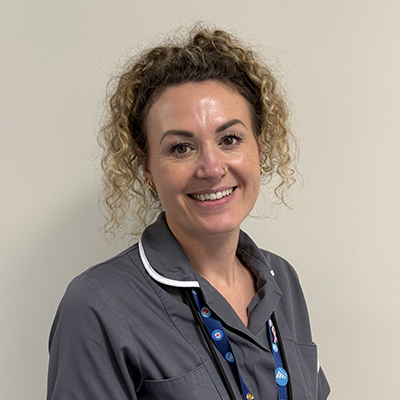Stephanie Brown

Stephanie qualified in 2007 and whilst over the past 18 years her career has taken her down many paths, the delivery of evidence based wound care has always been at the core of her professional values.
She was a Tissue Viability Nurse from 2009 – 2013 in a busy acute hospital before embarking on her Advanced Clinical Practice journey. During this time, she has had many opportunities to drive quality improvements in enhanced recovery, spinal surgery and the youth custody service. The highlight of Stephanie’s career prior to the opportunity to work with SoTV, was winning a Nursing Times Award for Children’s Services for implementing an annual health review for young offenders.
Stephanie feels very fortunate to be working in her dream role as an ACP in Plastic Surgery with a focus on quality improvement in the management of complex wounds. She works in close collaboration with the Tissue Viability team to streamline pathways for wound management which historically have not always aligned.
As a Professional Nurse Advocate and as an ACP, Stephanie feels in a privileged position to not only be able to apply current best practice into the services that she leads, but also to be able to drive quality improvement whilst supporting the workforce.
Free Paper and Poster Presentation (QI/Service Development) at The Society of Tissue Viability 2025 Conference
Clinical audit identifying compliance with wound assessment within an acute setting
Abstract
Background – Throughout the acute trust, a lack of standardised wound assessment in all clinical areas was acknowledged through clinical audit and investigation reporting. In addition to this, a CQC recommendation was made to improve on this standard of care. It was observed that this lack of clinical assessment often led to delays in providing evidence-based treatment, poor dressing selection, increase in demand from specialist teams for non complex wounds and delays in identifying complications.
The Professional Standards Record Body and National Wound care Strategy highlight a standard approach to wound assessment as a necessary process to ensure evidence-based practice, continuity of care, timely assessment and referral.
Methods – A clinical audit of a dressing clinic concluded that there was a lack of standard approach to wound assessment. This led to a wider audit of inpatient and outpatient areas which included, Plastic Surgery, ENT, Maxillofacial, General Surgery, Orthopaedics and Medicine to ascertain if there was an unwarranted variation within the documentation.
A nationally recognised approach to wound assessment (TIMES) and wound measurement were used as benchmarks to highlight if a standard approach to wound assessment had been adopted.
Results – The primary audit of the dressing clinic revealed that only 21% of wounds had documented measurements and out of a potential 234 wounds, only 28 had all aspects of the TIMES assessment completed.
The wider audit revealed that 47% of wounds were documented in the nursing notes. However, 0% of the wounds reported had a structured wound assessment completed in line with the TIMES framework or wound measurements.
Conclusions – The audit results indicated that approaches to wound assessment were variable across all clinical areas and that a structured approach had not been adopted.
The next steps would be for the authors to work in collaboration with the clinical areas to develop a digital wound assessment that would promote standardisation, continuity of care, timely and appropriate referral and escalation.
Presentation at Burns and plastics wound care study day
Plastics intervention for lower limb trauma
Introduction: It is widely accepted amongst wound care specialists and expert led agenda that early compression therapy is the gold standard for managing wounds on the lower limb at risk of delayed healing. A retrospective audit of the types of wounds presenting in the plastic surgery dressings clinic over a 2-week period highlighted that patients with lower limb wounds were amongst those with the highest number of clinic appointments per patient. In addition to this, there was lack of holistic lower limb assessment and structured wound assessment. The aim of this quality improvement initiative was to align lower limb wound care in the plastic surgery dressings clinic to national wound care standards for lower limb assessment and management.
Method: The commissioning of a wound care specialist role into a plastic surgery service presented an opportunity for quality improvement for this patient cohort. A referral pathway was developed to support early intervention following haematoma, pre-tibial laceration and failed split thickness skin graft following skin cancer removal.
Results / Discussion: Collaboration with the expert lower limb group and development of an early intervention pathway resulted in efficiency, productivity and application of evidence-based practice for this cohort of patients with a 50% reduction in outpatient appointments, early intervention with compression therapy and timely onward referral.
Conclusion: Through expert leadership the dressings clinic activity was aligned to evidence-based practice thus improving patient experience and outcomes, efficiency and productivity. Future service development has been proposed to further reduce outpatient clinic appointments for this patient group, this includes an outreach service to emergency portals, an education programme and recruiting lower limb champions to embed this pathway into practice.














